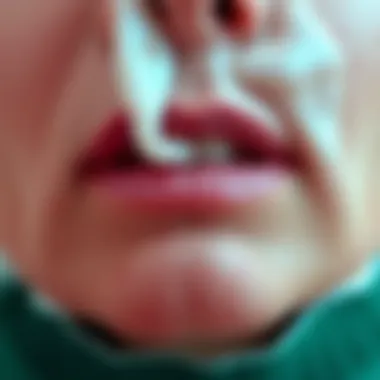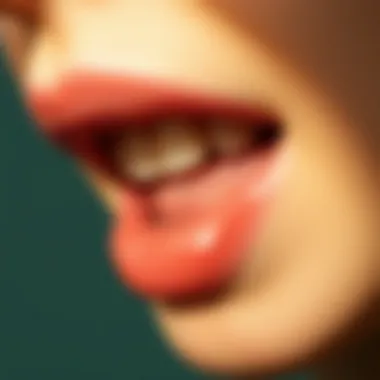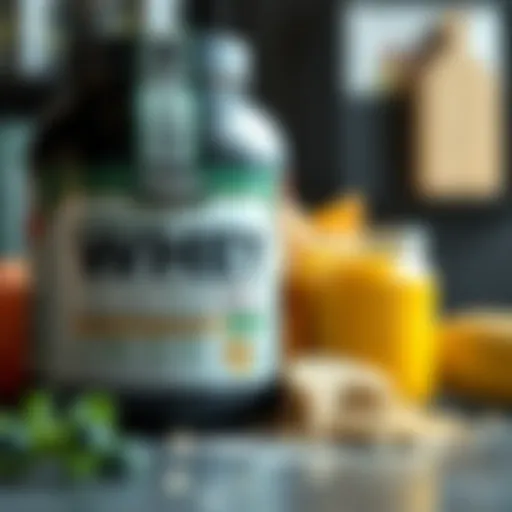Effective Treatments for Cold Sores at Mouth Corners


Intro
Cold sores, those unsightly blisters that often pop up at the corners of the mouth, are caused primarily by the herpes simplex virus. While many individuals endure occasional outbreaks, the discomfort and embarrassment they bring can be overwhelming. In this guide, we delve into effective treatment options to navigate through these pesky occurrences.
By examining the nature of cold sores and their underlying causes, we aim to equip readers—particularly health professionals, wellness coaches, and nutritionists—with valuable insights on managing and treating these outbreaks. Comprehensive methods are outlined, offering an array of approaches that range from preventative measures to alternative home remedies.
Understanding cold sores is not just about managing an existing outbreak; it also includes recognizing triggers and employing personalized strategies tailored to individual needs. Whether you're well-versed in medical knowledge or simply seeking effective solutions, this guide embraces a holistic perspective on cold sore treatment and management.
Understanding Cold Sores
Cold sores are more than just an aesthetic nuisance; they signify an underlying viral infection primarily caused by the herpes simplex virus (HSV). Understanding cold sores is crucial, particularly for health professionals, wellness coaches, nutritionists, fitness trainers, and mindfulness instructors. This understanding ensures informed discussions around prevention, management, and treatment options, fostering a broader awareness that can aid those affected.
Cold sores often emerge at the corners of the mouth, presenting not only physical discomfort but also emotional distress for many individuals. By exploring the nature of this common ailment, its causes, symptoms, and appropriate diagnostic techniques, one gains a comprehensive framework upon which effective treatment plans can be established.
The relevance of grasping the ins and outs of cold sores cannot be overstated. Such knowledge can lead to better management strategies that minimize outbreaks and alleviate symptoms. Furthermore, a deep dive into this topic reveals how lifestyle choices, medical interventions, and natural remedies intersect, allowing for personalized approaches in dealing with this troubling condition.
With that said, let’s peel back the layers and delve deeper into the specific facets of cold sores.
What Are Cold Sores?
Cold sores, often referred to as fever blisters, are small, fluid-filled lesions that typically occur around the lips and mouth. They are commonly caused by the herpes simplex virus type 1 (HSV-1), though HSV-2 can also be a culprit. The initial flare-up may come with a fever or swollen lymph nodes; once contracted, the virus remains dormant in the body and can reactivate due to various triggers.
These sores usually appear in clusters and can last anywhere from a few days to two weeks. Their appearance often coincides with a tingling sensation or itchiness, serving as early warnings that an outbreak is imminent. In this context, understanding the nature of cold sores is fundamental to managing one’s response, especially in professional settings where first impressions are essential.
Causes and Triggers
Various factors contribute to the development of cold sores. Understanding these causes is vital for preventing outbreaks. Key triggers include:
- Stress: Emotional or physical stress can weaken the immune system, making it easier for the virus to reactivate.
- Illness: Other viral infections can pave the way for cold sore outbreaks.
- Hormonal changes: Fluctuations during menstruation, pregnancy, or menopause might spur an outbreak.
- Sunlight: Prolonged sun exposure can damage the skin around the mouth, triggering flare-ups.
It's noteworthy that some people may carry the virus without ever experiencing noticeable symptoms. Reinforcing the importance of awareness and prevention, these individuals can still transmit the virus through close personal contact, like kissing or sharing utensils.
Symptoms and Diagnosis
Recognizing the symptoms of cold sores is crucial for timely intervention. The initial signs of an outbreak often include:
- Tingling or itching: A prodromal stage where discomfort signals an imminent outbreak.
- Red, swollen spots: Progressing into painful blisters filled with fluid.
- Crusting over: Eventually, the blisters burst and crust over, healing in about one to two weeks.
For diagnosis, a healthcare provider can often identify cold sores through a physical examination and the characteristic appearance. In uncertain cases, laboratory tests such as polymerase chain reaction (PCR) tests may be performed. Understanding these nuances allows health professionals to provide efficient care, recommend appropriate treatments, and educate individuals about the condition.
In summation, grasping these fundamentals lays the groundwork for effective approaches to treatment and prevention, enabling both individuals and professionals to tackle the challenges posed by cold sores with clarity and confidence.
Treatment Fundamentals
Understanding the fundamentals of treating cold sores is crucial, especially at the oft-neglected corners of the mouth. When a cold sore strikes, it isn’t just a mere cosmetic issue; it can also affect one’s self-esteem and daily interactions. Knowing the treatment options available empowers individuals to fight back against the discomfort. Treatment methodologies can be broadly classified into topical treatments and oral medications, each with distinct characteristics and advantages. This comprehensive understanding allows for personalized treatment strategies, which can lead to quicker healing and reduced frequency of outbreaks.
Overview of Treatment Options


When it comes to addressing cold sores, there are a variety of treatment paths one can take. It is essential to assess individual cases since what works wonders for one person might not be as effective for another. The treatments can be organized into two main categories: topical and oral. Topical treatments include gels, creams, and ointments applied directly to the affected area. On the other hand, oral medications are taken systemically, addressing the virus from within the body.
Educating oneself about these options broadens horizons about how to effectively manage outbreaks and can lead to better outcomes in the long term. This knowledge base is crucial for those in wellness professions who may guide their clients through the healing process.
Topical Treatments
Topical treatments are the front line in battling cold sores. They work directly on the lesions, providing immediate, localized relief. These treatments range from antiviral creams to moisturizing ointments. Let’s dig into the specifics.
Antiviral Creams
Antiviral creams stand out as a popular choice among cold sore remedies. They contain active ingredients like acyclovir, which target the herpes simplex virus directly. The key characteristic of antiviral creams is their ability to inhibit the virus's ability to replicate, which can speed up recovery time.
Unlike other treatments, the unique feature of these creams lies in their focused action at the site of the cold sore. Patients often find them beneficial because they can be used at the first sign of an outbreak, thus reducing the severity of the symptoms. However, the downside may include potential skin irritation for some users or the need for frequent applications.
Hydrocortisone Creams
Hydrocortisone creams offer another layer of treatment. This type of cream is primarily known for its anti-inflammatory properties. Utilizing hydrocortisone can lessen the swelling and redness associated with cold sores, making it a popular choice for soothing discomfort during outbreaks.
The key characteristic of hydrocortisone creams is their ability to relieve itching and irritation, providing a sense of comfort during an uncomfortable time. Their unique feature lies in their dual function: while they reduce inflammation, they may not attack the virus directly like antivirals. Users should be cautious, as prolonged use could result in skin thinning or diminished effectiveness over time.
Moisturizing Ointments
Moisturizing ointments deserve mention for their supportive role in the healing process. These products do not have direct antiviral action but are excellent for maintaining hydration in the affected area. Cold sores can introduce dryness and cracking; thus, keeping the area moist is crucial.
The standout characteristic of moisturizing ointments is their ability to create a protective barrier on the skin. This can shield the sores from initial external irritations – a smart addition to any treatment strategy. However, they might only work as an adjunct to more potent antiviral treatments, and some may find certain ointments too greasy, making them less preferable.
Oral Medications
For more persistent or severe outbreaks, oral medications may offer the respite one seeks. These systemic treatments can provide relief from multiple symptoms and reduce the overall frequency of outbreaks.
Antiviral Pills
Antiviral pills, like valacyclovir, enter the fray when topical options alone don’t cut it. These medications work throughout the body to combat the virus at a systemic level. They can be a game-changer for individuals dealing with recurrent cold sores.
The key characteristic of antiviral pills is their effectiveness in shortening the duration of an outbreak when taken promptly. Their unique feature involves their ability to prevent future recurrences with ongoing use, giving peace of mind to many patients. However, they can be costly and may come with side effects such as headaches or digestive issues.
Pain Relievers
Pain relievers, such as acetaminophen or ibuprofen, are another layer of treatment that addresses the uncomfortable symptoms associated with cold sores. While they do not treat the virus itself, they provide much-needed relief from pain and discomfort.
These medications are widely accessible and their primary characteristic is the quick alleviation of fever and pain. The unique advantage of pain relievers is their role in improving quality of life during an outbreak. Yet, users need to be cautious about not exceeding the recommended dosages, as overuse can lead to serious health concerns.
Preventive Medications
For those who experience frequent flare-ups, preventive medications might be worthwhile. These medications, similar to antiviral pills, can be taken on a long-term basis to reduce the frequency of outbreaks. They often contain lower doses of antiviral drugs that are taken daily.
The standout characteristic here is the proactive approach to managing cold sores. The unique feature of preventive medications is the reduction in the number of outbreaks and enhanced overall quality of life. That said, they require consistent adherence and, as with any medication, should be discussed with a healthcare provider to tailor the approach based on individual needs.


Home Remedies for Cold Sores
Home remedies for cold sores offer an accessible, cost-effective way to manage breakouts that appear at the corners of the mouth. Many individuals face the discomfort and social stigma associated with cold sores, making these remedies a valuable aspect of self-care. Using natural options can often lessen symptoms and speed up healing. However, it’s important to recognize that effectiveness can vary from person to person, and what works wonders for one may not have the same impact on another.
Natural Approaches
Aloe Vera
Aloe vera stands out as a popular home remedy for its soothing properties. This succulent plant has been recognized for its natural healing capabilities, making it beneficial in alleviating discomfort caused by cold sores. The gel-like substance inside its leaves acts as a natural moisturizer, which can help in reducing dryness and irritation. One key characteristic of aloe vera is its anti-inflammatory effect, which can ease the redness and swelling often associated with breakouts. While it’s generally safe for topical use, potential drawbacks include allergic reactions for some individuals. Knowing this, one should always do a patch test before applying it directly to the sore.
Apple Cider Vinegar
Apple cider vinegar is another notable contender in the home remedy arena. This fermented liquid is heralded for its antimicrobial properties, which may inhibit the growth of the herpes virus. An important characteristic of apple cider vinegar is its acidity, which can help in drying out blisters quicker than they would heal on their own. However, its strong flavor and potential stinging sensation on open sores can deter many. Diluting it with water can minimize discomfort while still harnessing its benefits.
Essential Oils
Essential oils, such as tea tree oil and peppermint oil, have gained popularity due to their purported antiviral effects. The strength of these oils can be striking—one drop might not only provide relief but also the aroma can offer a sense of wellbeing. A key advantage of essential oils is their concentrated nature, which means a little goes a long way. Yet, one must approach them with care, as they can be irritating to some skin types if not properly diluted. The risk of allergic reactions should prompt users to exercise caution.
Lifestyle Adjustments
Stress Management
Managing stress is an often-overlooked element in preventing cold sore outbreaks. Stress can weaken the immune system, making it less capable of fighting off the herpes simplex virus. Practicing stress management techniques like meditation or deep-breathing exercises can play a pivotal role in maintaining one's overall health. Additionally, engaging in regular physical activity not only improves mood but can also strengthen the body's defenses. However, individuals must choose methods they feel comfortable with; what works for one person might not suit another.
Nutrition and Hydration
Good nutrition and hydration are like the backbone of body wellness. Nutrient-dense foods bolster the immune system, while proper hydration helps keep the skin healthy. Foods rich in lysine, like yogurt and fish, may counteract the effects of arginine, an amino acid that can trigger cold sore outbreaks. When it comes to hydration, drinking sufficient water keeps the body functioning at its best. On the other hand, excessive caffeine and alcohol can lead to dehydration, potentially triggering an outbreak. Therefore, it’s beneficial to strike a balance in one’s daily intake.
Sleep Hygiene
Quality sleep is fundamental for maintaining a strong immune system. Sleep hygiene refers to habits conducive to sleeping well, such as maintaining a consistent sleeping schedule and creating a restful environment. When the body is well-rested, it’s more capable of combating infections, including those caused by the herpes virus. Adverse effects of poor sleep range from emotional stress to physiological vulnerability, which can lead to an increased likelihood of outbreaks. Thus, improving sleep habits can have a cascading positive effect on overall health.
Prevention Techniques
Understanding how to prevent cold sores is a key focus for managing outbreaks effectively. Recognizing that prevention is not just about avoiding the virus but also mitigating triggers can empower individuals. The benefits of prevention methods extend beyond just initial infection; they can significantly reduce the frequency and severity of future episodes. In this section, we’ll explore the essential hygiene practices, avoidance of specific triggers, and the emerging prospects of vaccination.
Hygiene Practices
Practicing good hygiene is fundamental when it comes to preventing cold sores. Simple actions can have a profound impact. Washing hands frequently and avoiding face-touching are paramount strategies. Cold sores are contagious, and the virus can easily spread from one person to another or to different parts of your own body. Here are some basic tips to keep in mind:
- Wash hands thoroughly: After touching your face or if lip-contact occurs.
- Avoid sharing personal items: Such as utensils, lip balms, or towels, to lower the risk of transmission.
- Use alcohol-based hand sanitizer: When soap and water are not available.
By imbibing these practices into everyday life, one significantly lowers the odds of triggering a cold sore outbreak.
Avoiding Triggers
One can't just sit back and wait for the cold sores to emerge; being proactive is vital. There are several common triggers that one must learn to identify and avoid.


Sun Exposure
Excessive sun exposure can act as a trigger for cold sores, leading to unpleasant outbreaks. The ultraviolet (UV) rays in sunlight can weaken the immune system, paving the way for the herpes virus to act up. It's crucial to protect your skin by using sunscreen on the lips and face. A high SPF lip balm can do wonders here. Be proactive and avoid long hours in direct sunlight, particularly during peak hours. The important characteristic is that even a single sunburn can spark an outbreak.
Illness and Fatigue
Another significant factor is illness and fatigue. When your body is run down, it can weaken your immune defenses. This condition creates an ideal environment for the herpes virus to re-emerge. Stress, a common companion of fatigue, can also play a role. So, it’s essential to take time for yourself. Managing stress levels and ensuring sufficient rest can go a long way in reducing the chance of an outbreak. Plus, one can also consider vitamins and supplements to bolster their immune system.
Skin Irritation
Skin irritation can also make cold sores more likely to appear. Factors like rough fabrics, exfoliating agents, or any trauma to the skin can trigger the virus. It's wise to avoid irritating your skin around the mouth. Gentle products should be your go-to for skincare around this sensitive area. This includes avoiding heavy scrubs or applying strongly scented products. Being mindful about what touches your skin can prevent creating ideal conditions for the herpes virus.
Vaccination Possibilities
As the medical field evolves, research continues into vaccination possibilities for cold sores. Currently, while there isn’t a widely available vaccine for HSV, ongoing trials are investigating various options that could help in providing immunity. The thought of a vaccine to prevent cold sores is increasingly promising, providing a sense of hope for many. Stay updated on developments concerning these advancements, as they may offer the most effective way to prevent this condition in the future.
When to Seek Medical Attention
Recognizing when cold sores at the corner of the mouth develop into a more serious issue is crucial for effective management. While many cold sores resolve on their own with time and proper care, there are instances when seeking medical help is not just recommended, but necessary. Understanding these circumstances can significantly improve outcomes and prevent complications.
A major part of the treatment strategy revolves around not just handling the symptoms but also gauging when those symptoms escalate. Ignoring severe signs may lead to more prolonged discomfort and even spread of the virus.
Identifying Severe Cases
It's essential to acknowledge the signs that indicate a cold sore is going beyond a typical outbreak. Here are some symptoms that should raise an alarm:
- Increased Pain: While discomfort is common, any sharp increase in pain could indicate a secondary infection.
- Prolonged Duration: If a cold sore lasts beyond two weeks, it’s a signal to consult a healthcare provider.
- Changes in Appearance: Should the sore become excessively swollen, bleed, or produce pus, seeking medical advice is prudent.
- Fever and Flu-Like Symptoms: The onset of systemic symptoms like fever or malaise can be indicative of a more serious viral activity.
- Recurring Outbreaks: Observing frequent outbreaks or a noticeable change in the frequency requires a medical opinion to evaluate potential underlying issues.
If any of these symptoms are present, it is best to reach out to a doctor or a dermatologist
"Not every cold sore is just a simple nuisance; sometimes they can signal a greater concern. Always listen to your body."
Long-Term Management
For those who experience frequent or severe cold sore outbreaks, long-term management strategies become vital. A proactive approach can make a significant difference in improving quality of life:
- Regular Monitoring: Keeping a log of outbreaks, treatments, and any potential triggers can help identify patterns and facilitate discussions with your healthcare provider.
- Ongoing Antiviral Therapy: In cases of severe or frequent outbreaks, a physician might prescribe antiviral medications such as Acyclovir or Valacyclovir for extended use.
- Personalized Action Plans: Collaborating closely with healthcare professionals to create a tailored management plan can enhance effectiveness. This may include a combination of lifestyle changes, topical medications, and oral antivirals.
- Educating Yourself: Knowledge about herpes simplex virus and its behavior allows for better management. Various resources, such as the CDC or educational websites like Mayo Clinic, can provide valuable insights.
By taking a more comprehensive view that includes both short-term responses and long-term strategies, individuals can gain control over their cold sore outbreaks, minimizing both pain and occurrences.
Epilogue
As we bring this detailed exploration of cold sores at the corner of the mouth to a close, it's essential to underscore the significance of understanding the multifaceted approaches to treatment. Cold sores can be more than just a cosmetic concern; they are a manifestation of the herpes simplex virus, often tied to emotional stress and physical well-being.
Emphasizing Personal Management
Recognizing when an outbreak occurs and how to manage it effectively can significantly lessen the discomfort associated with cold sores. This article has traversed various treatment options, from topical remedies to oral medications, enabling readers to personalize their approaches. Home remedies offer natural alternatives that might alleviate symptoms for some, while others may find more success with prescribed medications. Each person's experience can differ markedly, highlighting the importance of a tailored treatment regimen.
Benefits of Proactive Prevention and Awareness
Moreover, our discussion on preventative measures, such as hygiene practices and avoiding triggers, is paramount. By being aware of potential causes and outcomes, individuals can proactively prevent future outbreaks. This proactive mindset fosters not only better physical health but also boosts confidence, knowing one is equipped to tackle such challenges.
"Understanding how to manage cold sores holistically offers a strategic advantage, enhancing both physical comfort and emotional resilience."
Navigating Medical Considerations
Finally, knowing when to seek medical attention is critical. Some outbreaks may be severe or recurrent, indicating that professional help might be necessary. This article strives to empower readers with the knowledge they need not only to handle symptoms but also to navigate their broader healthcare journey concerning cold sores.
As you ponder the multifarious elements discussed herein, may the insights offered help you or those you support in managing the discomfort brought on by cold sores. Optimal health is a journey, and being well-informed is a key step towards achieving that destination.















